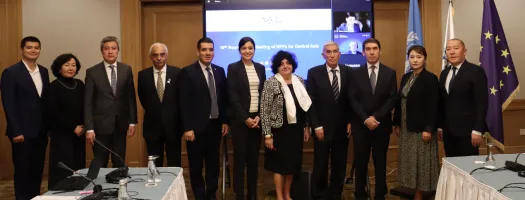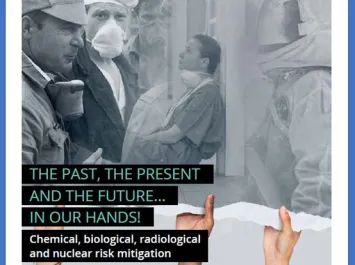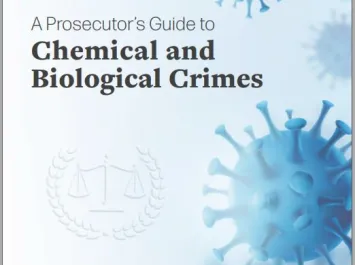The Regional Secretariat for Central Asia of the EU’s Chemical, Biological, Radiological and Nuclear (CBRN) Risk Mitigation Centres of Excellence (CoE) achieved another significant milestone by successfully organizing the 19th Round Table Meeting of the CBRN CoE National Focal Points for Central Asia on October 20th, 2023, in Almaty, Kazakhstan. The meeting brought together a distinguished gathering of experts and key stakeholders to engage in dynamic discussion on critical CBRN threat-related issues.
The meeting commenced with a series of opening remarks delivered by prominent figures including Mr. Bakhtiyor Gulyamov, Head of the Secretariat for Central Asia (CA); Mr. Sorin Popa, CBRN CoE Programme Manager for Central Asia, Foreign Policy Instrument Service, European Commission; and Mr. Maciej Madalinski, Deputy Head of Mission, Delegation of the European Union in Kazakhstan. These opening addresses fostered an atmosphere of collaboration and productive discussions. The EU CBRN CoE Regional Secretariat for Central Asia provided a comprehensive update on its activities, emphasizing efforts made in strengthening regional cooperation and preparedness against CBRN threats.
A pivotal moment of the meeting unfolded with the presentation of the newly approved project for enhancing the protection and security of CBRN critical infrastructure in the South East and Eastern Europe and Central Asia regions. This project aims to bolster protection measures against potential CBRN threats by developing robust frameworks and strategies for critical infrastructure resilience. The presentation sparked engaging discussions among participants, who shared their insights and expertise regarding the steps to be undertaken to ensure that the partner-countries of Central Asia fully benefit from the project interventions.
Furthermore, the discussions of the Round Table Meeting primarily evolved around the elaboration of the project concept aimed at mitigating the risks of zoonotic diseases that may arise due to climate change. Experts from partner-countries presented on the risks of zoonotic diseases across Central Asia and potential impacts of climate change. Following the presentations, a productive dialogue ensued, during which National Focal Points and experts exchanged ideas and explored potential solutions to mitigate these evolving risks.
The meeting also featured a presentation by the National Scientific Center of Especially Dangerous Infections named after Masgut Aikimbayev. Their contribution offered valuable insights into their significant expertise and advancements in managing the risks of zoonotic diseases.
The meeting concluded with a wrap-up session, during which participants confirmed the relevance, timeliness and importance of efforts to mitigate the risks of zoonotic diseases that may arise from climate change in Central Asia.
Background information
The EU CBRN CoE Initiative is a global Initiative funded and implemented by the European Union as part of its goal to promote peace, stability and conflict prevention.
The aim of the Initiative is to mitigate risks and strengthen an all-hazards security governance in Partner Countries of the EU following a voluntary and demand-driven approach. The EU support is provided to implement a wide range of CBRN risk mitigation activities including needs and risk assessments, national and regional action plans, capacity building activities, legal framework reviews, table top and real time (including cross-border) field exercises, inter-regional exchange of best practices and lessons learnt.
Funded and implemented through the Neighbourhood, Development and International Cooperation Instrument (NDICI) – Global Europe, the Initiative is led by the European Commission’s Service for Foreign Policy Instruments (FPI), in close coordination with the European External Action Service (EEAS). The European Commission's Joint Research Centre (JRC) provides technical support to Partner Countries, while the United Nations Interregional Crime and Justice Research Institute (UNICRI) ensures a coherent and effective national, regional and international cooperation. Other relevant International and/or Regional Organisations and experts also contribute to the Initiative, which represents the EU’s largest civilian external security programme. The initiative involves 64 countries in eight regions across the world.



